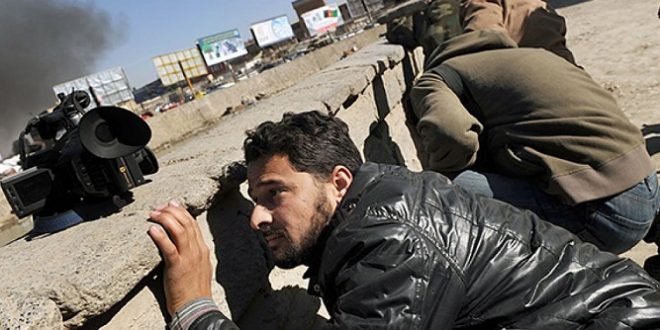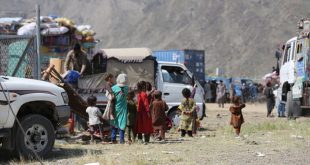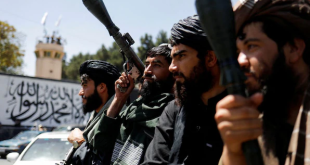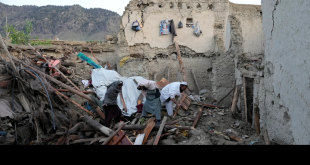AT News Report
KABUL: For the first time National Journalists Day was marked in Kabul on Monday with participation of government officials, reporters, representative of media outlets, and other free media lover including the UNAMA head.
The commemoration made after the National Unity Government named 27th Hoot, March 18, as Journalists National Day while Afghanistan in the 2018 named deadliest year to be a journalist, and already four journalists were killed in 2019 so far.
Only three days before National Journalist Day, the killing of Sultan Mahmoud Khirkhowa in Khost, the fourth killing of a journalist in Afghanistan so far, gave a sad reminder of what it means to be a journalist in Afghanistan and the bravery it requires.
Today, media outlets had celebrated their day, which is highlighting and honoring the courage of Afghan journalists, who stand up to intimidation and threats, risking their life in their fight for freedom of press. But, they (Afghan Journalists) need more protection as last week, Nisar Ahmadi, a local TV journalist in Helmand, was received injures in a blast in Lashkargah, the capital city of Helmand province.
Second Vice President Mohammad Sarwar Danish marked the Journalists National Day at a ceremony in Kabul, saying the government fully supports the freedom of press.
The government and people of Afghanistan support peace in a bid to preserve the past 18 years’ achievements, especially the freedom of the press, Danish said.
“All stakeholders in Afghan peace talks should assure the people that freedom of the press should not be sacrificed.”
Recently, US and Taliban members concluded their fifth round of talks in Qatar, where both sides made progress on four points—counterterrorism efforts, withdrawal of troops, not using Afghan soil against other country, and intra-Afghan talks.
But, the Taliban group time and again rejected meeting Afghan peace team that casted doubt over intention of Taliban wither accept the last 18 years’ achievements that includes freedom of expression and media.
Danish made clear that freedom of press must be preserved in the talks with the Taliban—something Taliban group had strongly opposed during their regime.
Moreover, a group of Afghan journalists in eastern Nangarhar province marked journalist day, while expressed their anxiety over safety of reporters and media workers that recently violence against them increased.
According to them, besides threats by armed men, they also face threats by individuals within the government.
It is worth mentioning that Afghanistan was named deadliest year for journalists in 2018 putting security as the biggest challenge for them.
According to a latest report by Reporters Without Borders (RSF), Afghanistan has been the world’s deadliest country for journalists in 2018, where it says 13 journalists and 2 media workers were killed, all before the October parliamentary elections.
Nine of them, including senior photojournalist Shah Marai, were killed in twin blasts in April this year, the deadliest attack on the media in Afghanistan since 2001.
Reza Moini, the head of RSF’s Afghanistan desk, was quoted saying that the increase in targeted attacks on journalists in the run-up to elections had threatened “the Afghan people’s sovereignty and democratic choice.”
In October this year, at the re-launch of Journalists Support Fund in Kabul – a fund meant to help members of the Afghan media fraternity including families of those killed while covering war President Ghani said his government was not at odds with the media and the two should work together because they have “shared goals”.
In an event announcing government’s information system plan in March 3rd, Second Vice President Sarwar Danish said government strongly back the past hard gained achievements, with totally rejecting any sorts of compromise in regards with the Taliban group.
“Freedom of speech is a sign for all rights, including human rights and democracy,” he said in that time, putting freedom of expression is a red line in peace talks.
Furthermore, Afghan Journalists Safety Committee in a statement sent to Afghanistan Times expressed its heartfelt congratulations to Afghan journalists and media workers on the occasion of March 18, which was recently designated as Journalist Day by the government of Afghanistan.
“Press freedom and freedom of expression are two of the biggest achievements of
the post-Taliban era. Today, more than four hundred media outlets and thousands
of media workers strive day and night to serve as the conveyor of truth to
Afghan people, hold the government accountable and support democracy and human
rights in a country which has been damaged by four decades of war. Their role
in bolstering state building, narrowing the gap between the center and
periphery and promoting transparency is of paramount importance.”
On the occasion of Journalist Day, AJSC once again called on the Afghan government, particularly Afghan security forces, to take any necessary measures towards protection of journalists and ensure prosecution of perpetrators of violence.
“AJSC also calls on international organizations, particularly, the United Nations, to urge the belligerents, particularly the Taliban and the Afghan government, to immediately stop targeting journalists.”
Currently 98 TV channels, 65 radio stations and 911 printed media have been active in capital, and 107 TV channels, 284 radio stations and 416 printing media outlets active in provinces.
According to Second Vice President Danish, totally 1,879 TV Channels, Radio Stations and Printing Media outlets are active throughout the country, which is a sign of good circumstance of freedom of speech in Afghanistan.
 Afghanistan Times
Afghanistan Times




